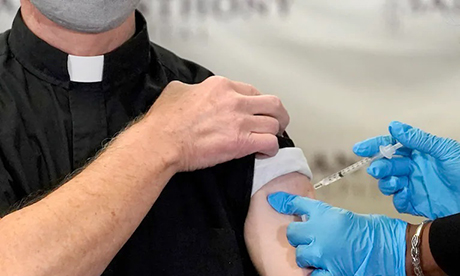Some Catholic leaders have argued that all three Covid-19 vaccines are morally acceptable, pushing back against U.S. Catholic bishops questioning the morality of taking coronavirus vaccines.
They have said the shots are moral and are needed urgently to save lives.
The barrage of differing philosophical opinions on the three approved vaccines were based on how central the use of fetal cell lines was in their production.
The lines are essentially reproductions of fetal cells from abortions done in the 1970s and 1980s. The shots themselves don’t actually contain fetal cells.
Earlier this week, the chairs of the U.S. bishops’ conference committees on doctrine and pro-life activities issued a statement advising Catholics awaiting a COVID-19 vaccine to choose, if possible, the Pfizer or Moderna vaccines over the recently approved Johnson & Johnson’s.
This was due to a less remote connection between this newest vaccine and abortion. A previous statement by the New Orleans Archdiocese characterized the Johnson & Johnson vaccine as “morally compromised.” A handful of other bishops have concurred.
Some Catholic leaders and medical professionals worried that the stream of criticism over the Johnson & Johnson shot could discourage devout Catholics from getting vaccinated. Some felt the need to say explicitly that getting a vaccine is not at all problematic morally, and there is an ethical imperative to do so.
The Congregation for the Doctrine of the Faith noted that due to the very production and distribution challenges currently in place in the U.S. and globally, “it is morally acceptable to receive Covid-19 vaccines that have used cell lines from aborted fetuses in their research and production process.”
They continue that due to the “grave danger” presented by the spread of the SARS-CoV2 virus that causes Covid-19, “all vaccines recognized as clinically safe and effective can be used in good conscience.”
And they emphasize that while vaccination — like all medical interventions — is voluntary, there is a moral “duty to protect one’s own health [as well as] the duty to pursue the common good.”
A group of prominent conservative Catholic scholars said none of the vaccines developed in the U.S. so far should be seen as “more morally tainted” than one another.
The statement by the eight scholars noted that the abortion was not done in order to provide research material. The scientists working to develop the coronavirus vaccines decades later were not involved in the abortion. The cell line is so common for testing that “the great majority of processed/packaged food products available for sale in the United States are likely to contain ingredients produced or tested” with it.
